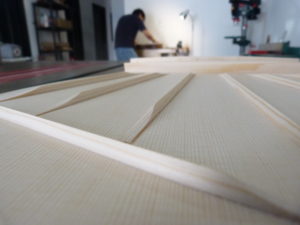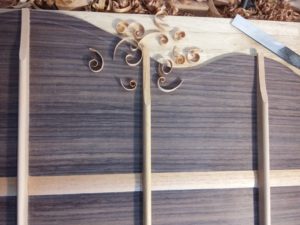
If you read the first part of this blog entry, you already have an idea of why a hand made guitar is different from a production guitar. Here we'll see in what other ways these types of instruments differ.
Continuing with elusive and complex subjects, we have the issue of artistic value. Is a guitar a work of art? Is every guitar a work of art? There is evidently something special and artistic in a fine hand made guitar. A fine hand made guitar will always be unique. Just like every cook conveys his own characteristic "taste" into everything he cooks, and every guitarist has his/her particular sound - no matter what guitar he plays on - every luthier imparts a unique personality into his guitars. Luthier guitars also tend to vary more from one specimen to the other; each guitar is an individual. Factory guitars, like any other mass-produced item, are very consistent and similar from one to the next. It's kind of like comparing a painting to a poster. So many individuals interact directly and indirectly with a factory guitar during its manufacturing process that hardly any individuality comes through in the finished instrument. Again, this is not necessarily a shortcoming; but a fine hand made guitar is an individual that possesses many human characteristics. You can even say it has a soul. And this can provide just the excitement, fascination, and inspiration that a musician is looking for. For some musicians, the simple fact that their instrument is a unique piece of art is, in itself, a source of inspiration. Others just need a working man's guitar to get through the gig.
Artistic value goes way beyond the craftsmanship of an instrument. Of course, this is an important part, but the most finely handcrafted instrument is not useful if it is uncomfortable to play, or if its sound is disappointing. In a guitar, the artistic side needs to encompass every aspect of the instrument (sound, ergonomics, aesthetics, so on...) and also how all of these aspects work together coherently to produce a work of art. A luthier makes all of the decisions regarding his guitars and therefore has enough artistic freedom to realize his/her artistic vision.
A luthier also has the freedom to try out new ideas, make changes, and constantly adjust his/her designs. We are incessant tweakers by nature, and in our never-ending search for a better guitar, practically every luthier evolves his/her designs, construction methods, processes, etc. frequently. This is not viable in a large production setting where precision, repeatability, and consistency are not only desired but also necessary. Factory production is only feasible if you can work in a repeatable way during long production runs. This allows high production rates with consistent quality. Any variations from one guitar to the next require specific attention to each guitar, which is time-consuming. If a factory makes 700 guitars a day, a small adjustment on each guitar that would require a craftsman 15 minutes to perform, would add up to roughly 5250 man-hours a month! For a luthier making just one guitar a month that could be easily accommodated by extending one of his workdays by 15 minutes or skipping one of his coffee breaks.

Furthermore, there are designs and processes that don't translate well to a production line. For example, there is no short way to french polish a guitar, and doing this in a production setting has to be very challenging. I saw some examples of so-called "French polish" on production guitars, which were actually sprayed or brushed shellac finishes emulating French polish. These are perfectly fine finishes for a guitar but are quite different from real French polish. So production guitars are limited by what can actually be done on a production line. On the other hand, a luthier's main limitation is his own skill. Practically every design or construction method is available to him as long as he has the skill to do it.
So, is all that extra time a luthier spends on his guitar really justified? Let me put it this way: your typical luthier does not spend his day searching for inspiration while looking at the horizon and slowly sanding a piece of wood. It makes for a nice image on a commercial, but it is just not true. Every luthier needs to work as fast as he can without compromising the quality of his work. We all need to make a living, and we can't afford to waste a single second of work time. For the most part, a luthier can work incredibly fast. But when working at a high level of workmanship, you quickly run into the law of diminishing returns; to obtain a marginal improvement, we must spend lots of time. So most of our time goes into small details and fine adjustments to obtain small improvements. These small improvements, however, quickly add up and make a big difference in the finished instrument. The misconception is that working by hand makes us slower. This is not entirely true; the truth is that working by hand allows a luthier to make many more fine adjustments and detail work, which are not immediately evident, but that will have a great impact on the finished instrument.
There is still one more big difference worth considering: the luthier himself. The relationship between a guitarist and his luthier is a seller-customer relationship, right? Well... no. It is much more complicated. You need to open your mind to understand that this is very different from most other commercial relationships. A luthier should be an advisor. A luthier should learn as much from a guitarist as a guitarist learns from him. Some people appreciate the fact that they can deal with a person, someone they can have a conversation with to discuss their ideas and concerns; a conversation with the same person that will make their guitar. Although this is not always necessary when buying a guitar, it is worth keeping in mind that when dealing with a luthier, you receive much more than a guitar.
There is more to analyze, but I believe this covers a fair amount of ground in starting to understand the differences between one type of guitar and the other. In the end, the player needs to make an informed decision about what kind of guitar better suits his/her needs, means, and expectations. I hope I was able to provide some material to think about that will hopefully help you better understand your relationship with your instrument. And understanding this relationship is the key to finding your dream guitar.
Thanks for your support! Please leave any comments, suggestions, and opinions; if you have any ideas about topics you would like me to address in future entries, please do so in the comments section. I will try my best to comply. Until the next time!
